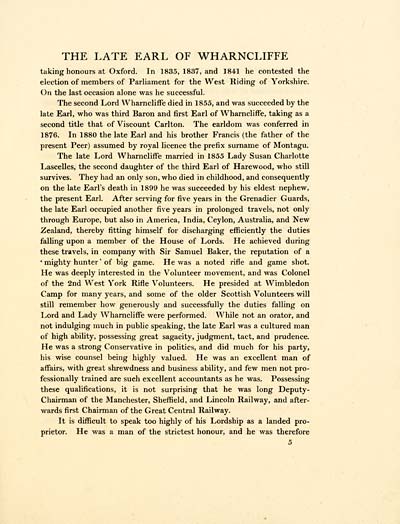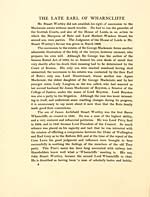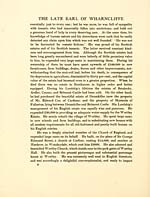Download files
Complete book:
Individual page:
Thumbnail gallery: Grid view | List view

THE LATE EARL OF WHARNCLIFFE
taking honours at Oxford. In 1835, 1837, and 1841 he contested the
election of members of Parliament for the West Riding of Yorkshire.
On the last occasion alone was he successful.
The second Lord Wharncliffe died in 1855, and was succeeded by the
late Earl, who was third Baron and first Earl of Wharncliffe, taking as a
second title that of Viscount Carlton. The earldom was conferred in
1876. In 1880 the late Earl and his brother Francis (the father of the
present Peer) assumed by royal licence the prefix surname of Montagu.
The late Lord Wharncliffe married in 1855 Lady Susan Charlotte
Lascelles, the second daughter of the third Earl of Hare wood, who still
survives. They had an only son, who died in childhood, and consequently
on the late Earl's death in 1899 he was succeeded by his eldest nephew,
the present Earl. After serving for five years in the Grenadier Guards,
the late Earl occupied another five years in prolonged travels, not only
through Europe, but also in America, India, Ceylon, Australia, and New
Zealand, thereby fitting himself for discharging efficiently the duties
falling upon a member of the House of Lords. He achieved during
these travels, in company with Sir Samuel Baker, the reputation of a
' mighty hunter ' of big game. He was a noted rifle and game shot.
He was deeply interested in the Volunteer movement, and was Colonel
of the 2nd West York Rifle Volunteers. He presided at Wimbledon
Camp for many years, and some of the older Scottish Volunteers will
still remember how generously and successfully the duties falling on
Lord and Lady Wharncliffe were performed. While not an orator, and
not indulging much in public speaking, the late Earl was a cultured man
of high ability, possessing great sagacity, judgment, tact, and prudence.
He was a strong Conservative in politics, and did much for his party,
his wise counsel being highly valued. He was an excellent man of
affairs, with great shrewdness and business ability, and few men not pro-
fessionally trained are such excellent accountants as he was. Possessing
these qualifications, it is not surprising that he was long Deputy-
Chairman of the Manchester, Sheffield, and Lincoln Railway, and after-
wards first Chairman of the Great Central Railway.
It is difficult to speak too highly of his Lordship as a landed pro-
prietor. He was a man of the strictest honour, and he was therefore
5
taking honours at Oxford. In 1835, 1837, and 1841 he contested the
election of members of Parliament for the West Riding of Yorkshire.
On the last occasion alone was he successful.
The second Lord Wharncliffe died in 1855, and was succeeded by the
late Earl, who was third Baron and first Earl of Wharncliffe, taking as a
second title that of Viscount Carlton. The earldom was conferred in
1876. In 1880 the late Earl and his brother Francis (the father of the
present Peer) assumed by royal licence the prefix surname of Montagu.
The late Lord Wharncliffe married in 1855 Lady Susan Charlotte
Lascelles, the second daughter of the third Earl of Hare wood, who still
survives. They had an only son, who died in childhood, and consequently
on the late Earl's death in 1899 he was succeeded by his eldest nephew,
the present Earl. After serving for five years in the Grenadier Guards,
the late Earl occupied another five years in prolonged travels, not only
through Europe, but also in America, India, Ceylon, Australia, and New
Zealand, thereby fitting himself for discharging efficiently the duties
falling upon a member of the House of Lords. He achieved during
these travels, in company with Sir Samuel Baker, the reputation of a
' mighty hunter ' of big game. He was a noted rifle and game shot.
He was deeply interested in the Volunteer movement, and was Colonel
of the 2nd West York Rifle Volunteers. He presided at Wimbledon
Camp for many years, and some of the older Scottish Volunteers will
still remember how generously and successfully the duties falling on
Lord and Lady Wharncliffe were performed. While not an orator, and
not indulging much in public speaking, the late Earl was a cultured man
of high ability, possessing great sagacity, judgment, tact, and prudence.
He was a strong Conservative in politics, and did much for his party,
his wise counsel being highly valued. He was an excellent man of
affairs, with great shrewdness and business ability, and few men not pro-
fessionally trained are such excellent accountants as he was. Possessing
these qualifications, it is not surprising that he was long Deputy-
Chairman of the Manchester, Sheffield, and Lincoln Railway, and after-
wards first Chairman of the Great Central Railway.
It is difficult to speak too highly of his Lordship as a landed pro-
prietor. He was a man of the strictest honour, and he was therefore
5
Set display mode to:
![]() Universal Viewer |
Universal Viewer | ![]() Mirador |
Large image | Transcription
Mirador |
Large image | Transcription
Images and transcriptions on this page, including medium image downloads, may be used under the Creative Commons Attribution 4.0 International Licence unless otherwise stated. ![]()
| Histories of Scottish families > Ancient deeds and other writs in the Mackenzie-Wharncliffe charter-chest > (177) Page 5 |
|---|
| Permanent URL | https://digital.nls.uk/95525489 |
|---|
| Description | A selection of almost 400 printed items relating to the history of Scottish families, mostly dating from the 19th and early 20th centuries. Includes memoirs, genealogies and clan histories, with a few produced by emigrant families. The earliest family history goes back to AD 916. |
|---|

